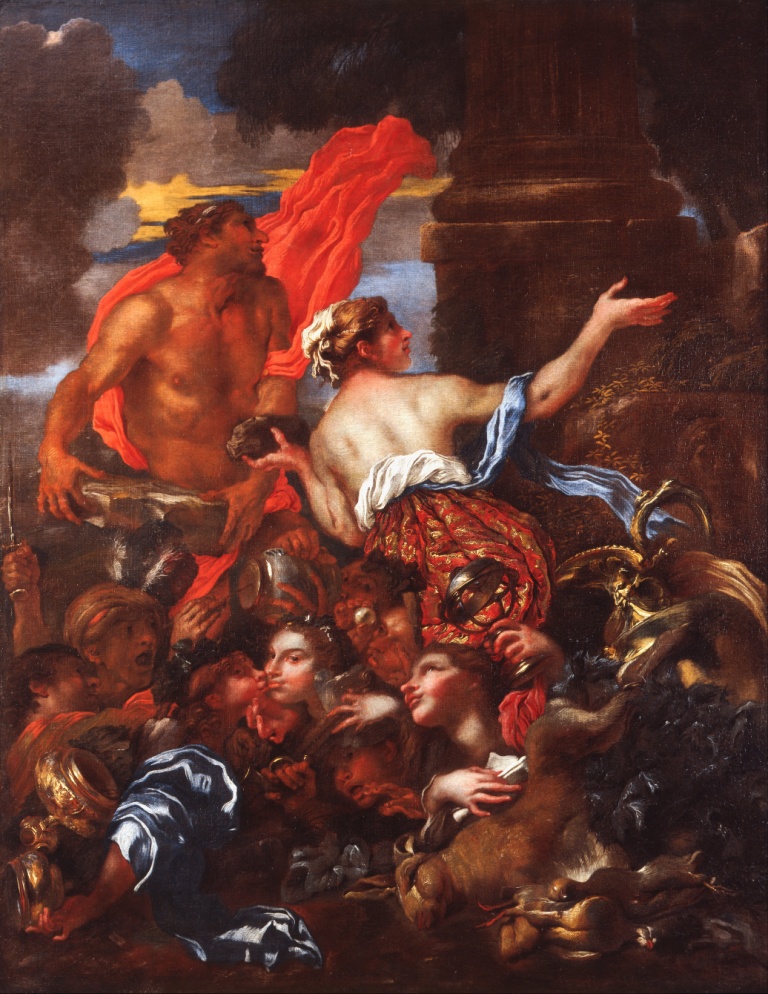
Noah and Deucalion

Giovanni Benedetto Castiglione:
Deucalion and Pyrrha
Google Art Project
|
There are many flood myths across different cultures. These stories often share similar themes, though the details may vary. They usually involve a divine being who decides to flood the world because of human wickedness, a single righteous person or family who is warned of the coming deluge, and a means of survival that typically involves building a boat or a similar vessel. |
|
|
Greek Mythology (Deucalion's Flood) |
Biblical Flood (Noah's Ark) |
|
Cause |
Zeus decided to destroy the Bronze Age due to the wickedness and impiety of men. |
God decided to destroy all life due to mankind's wickedness and violence. |
|
Hero |
Deucalion (son of Prometheus) and his wife Pyrrha. |
Noah and his wife, their three sons and their wives. |
|
Divine Warning |
Prometheus, Deucalion's father, warned him about the impending flood. |
God warned Noah directly about the upcoming flood, emphasizing a personal relationship between deity and devotee in Judeo-Christian tradition. |
|
Survival Method |
They built a chest at the advice of Prometheus. |
Noah built an ark following God's detailed instructions. |
|
Duration of Flood |
Zeus caused the rains to fall for nine days and nights. |
The rain lasted for forty days and forty nights. |
|
End of Flood |
Deucalion made sacrifices to Zeus and the waters receded. |
The waters receded after 150 days, and Noah sent out a raven and then a dove to check for dry land. |
|
Promise |
After the flood, Zeus promised never to destroy humankind again, symbolizing a shift in divine-human relations from wrath to mercy. |
God made a covenant with Noah and all future generations, promising never to send another flood to destroy the earth. He set a rainbow in the sky as a sign of this promise. |
|
Repopulation |
Deucalion and Pyrrha threw stones over their shoulders, which became people. |
Noah, his family, and the animals left the ark and repopulated the earth. |
|
Hero's Reward |
Deucalion and Pyrrha were saved for their piety and righteousness. They became the ancestors of the new human race. |
Noah was considered righteous and blameless among the people of his time, symbolizing the Judeo-Christian values of obedience and piety. He was saved because of his obedience. His descendants repopulated the earth. |
|
Cause of the Flood: Both stories attribute the cause of the flood to divine displeasure with human wickedness. In Greek mythology, Zeus decides to destroy the Bronze Age due to the wickedness and impiety of men. Similarly, in the biblical account, God decides to flood the Earth because of mankind's evil behavior. |
||
|
Hero's Forewarning: In both narratives, a divine entity provides the protagonists with a warning about the upcoming catastrophe. Prometheus, Deucalion's father, warns him in the Greek story, while God directly warns Noah in the biblical account. |
||
|
Survival Mechanism: Both stories involve the building of a structure to survive the flood. Deucalion builds a chest based on Prometheus' advice, while Noah builds an Ark following God's instructions. |
||
|
Post-flood Promise: After the floods recede, both Zeus and the biblical God make a promise never to destroy humankind by a flood again. |
||
|
Repopulation: Both stories also involve the repopulation of the Earth. Deucalion and Pyrrha repopulate the Earth by throwing stones over their shoulders that transform into people. Noah, his family, and the animals that survived in the Ark repopulate the Earth in the biblical narrative. |
||
|
Hero's Reward: Both heroes, Deucalion and Noah, are rewarded for their piety and righteousness. They survive the flood and become the ancestors of the new human generations. |
||
|
These similarities reflect common themes about divine justice, human survival, and the rebirth of mankind that are prevalent in many cultures' mythologies and religious texts. |
||
![]() ©
by
Dr. Hilmar Alquiros,
The Philippines
Impressum Data
Protection Statement / Datenschutzerklärung
©
by
Dr. Hilmar Alquiros,
The Philippines
Impressum Data
Protection Statement / Datenschutzerklärung ![]()